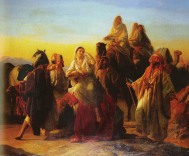Originally written in Greek, this testament is only know in translation. The book is dependent on the Testament of Abraham and therefore must be dated after the first century. While Stinespring dates the book to the second century A.D., he also notes the popularity of the book among Coptic Christians and speculates the book may have had an origin in the Coptic Christian church, requiring a much later date. In the end he settles for an original form in Greek, written by an Egyptian Jew which has been Christianized at a much later date (OTP 1:903-904). If the book can be dated to the second century, then it would contain a very early Trinitarian statements such as the opening verse (Father, Son and Holy Spirit in apposition with “One God”).
 After a two-verse introduction we read that Isaac has called his family together in testament-like fashion. He tells his family the one who has a pure heart and faith in God will be an inheritor of the kingdom of God. God is compassionate and has received thieves and tax-collectors to himself (the thief on the cross and Matthew, Zacchaeus, presumably.) This is an example of the obvious “christianizing” of the text.
After a two-verse introduction we read that Isaac has called his family together in testament-like fashion. He tells his family the one who has a pure heart and faith in God will be an inheritor of the kingdom of God. God is compassionate and has received thieves and tax-collectors to himself (the thief on the cross and Matthew, Zacchaeus, presumably.) This is an example of the obvious “christianizing” of the text.
Just as in the Testament of Abraham, chapter 2 begins with Michael the archangel dispatched from heaven to visit Isaac before he dies. Isaac thinks the angel is his father Abraham, but eventually he figures out this is an angel. Isaac is concerned for his son Jacob since this appears to be after Jacob has offended him. The angel responds that Jacob will be protected by the Supreme God as well as the Son and the Holy Spirit (a rather Trinitarian thing for a Jew to say!) He does not want Jacob to hear the news he is about to die.
Jacob comes to his father and is ignorant of his impending death (ch. 3). Jacob wants to go with his father, but Isaac explains he is about to die and cannot change the decree. In verses 17-19 there is an odd bit of prophecy of twelve giants, then Jesus the Messiah will come from a virgin named Mary. God will be incarnate in him until the completion of a hundred years. This is a very odd text indeed since we cannot really know what we are to make of the “giants.” If these are “kings,” then we would have a typical run of Roman emperors, but there were clearly not twelve prior to the incarnation. Nor is there a convenient run of twelve kings among the Herodians, Hasmoneans, or earlier kings. That God will be incarnate is obviously Christian, but the period of a hundred years cannot be a reference to the life of Jesus unless the author was ignorant of the facts of Jesus’ life.
When people begin to gather when they hear a man of God has visited, Jacob asks Isaac to begin a discourse to comfort him (ch. 4). The rest of this lengthy chapter is a moral exhortation which in some ways is Jewish (“do not present an offering when you are not ritually clean”) yet in other ways distinctly Christian (“guard your body, it is the temple of the Holy Spirit,” similar to 1 Cor. 6). This blending may be the result of an incomplete “Christianizing” of a Jewish document.
While crowds are impressed with Isaac’s speech, an angel comes and takes him up into heaven. Isaac has a short “heavenly journey” including a river of fire and the “overseer of punishment” of Hell. This journey section continues as Isaac ascends into heaven to see Abraham. Isaac is brought before the throne of God and he worships along with Abraham. The Lord commands Isaac to not profane the body since it is in the image of God. The Lord takes Isaac’s soul from his body, which is snow white, and he places it on his holy chariot and they ascend into the heavens.
According to chapter 8, the day this happened was the twenty-eighth day of Misri, a day the writer still commemorates. The one that keeps this day will be blessed and will be present at the millennial banquet. This is clearly a Christian gloss, since the writer describes the kingdom as the kingdom of “our God and our King and our Savior, Jesus the Messiah.”
Testament of Isaac 8.6 Whatever person has manifested mercy in the name of my beloved Isaac, behold I will give him to you in the kingdom of heaven and he shall be present with them at the first moment of the millennial banquet to celebrate with them in the everlasting light in the kingdom of our Master and our God and our King and our Savior, Jesus the Messiah.
I think there is no argument that the Testament of Isaac, just like the Testament of Jacob, was written in Greek. At least in there present form, they are replete with Coptic literary topoi. I would suggest that Coptic is the original language, from which they were later translated into Arabic, and into Ethiopic from Arabic.
Thanks for this response. Can you give an example or two of your suggested Coptic literary topoi? Perhaps you written an article you can point me to with the data.